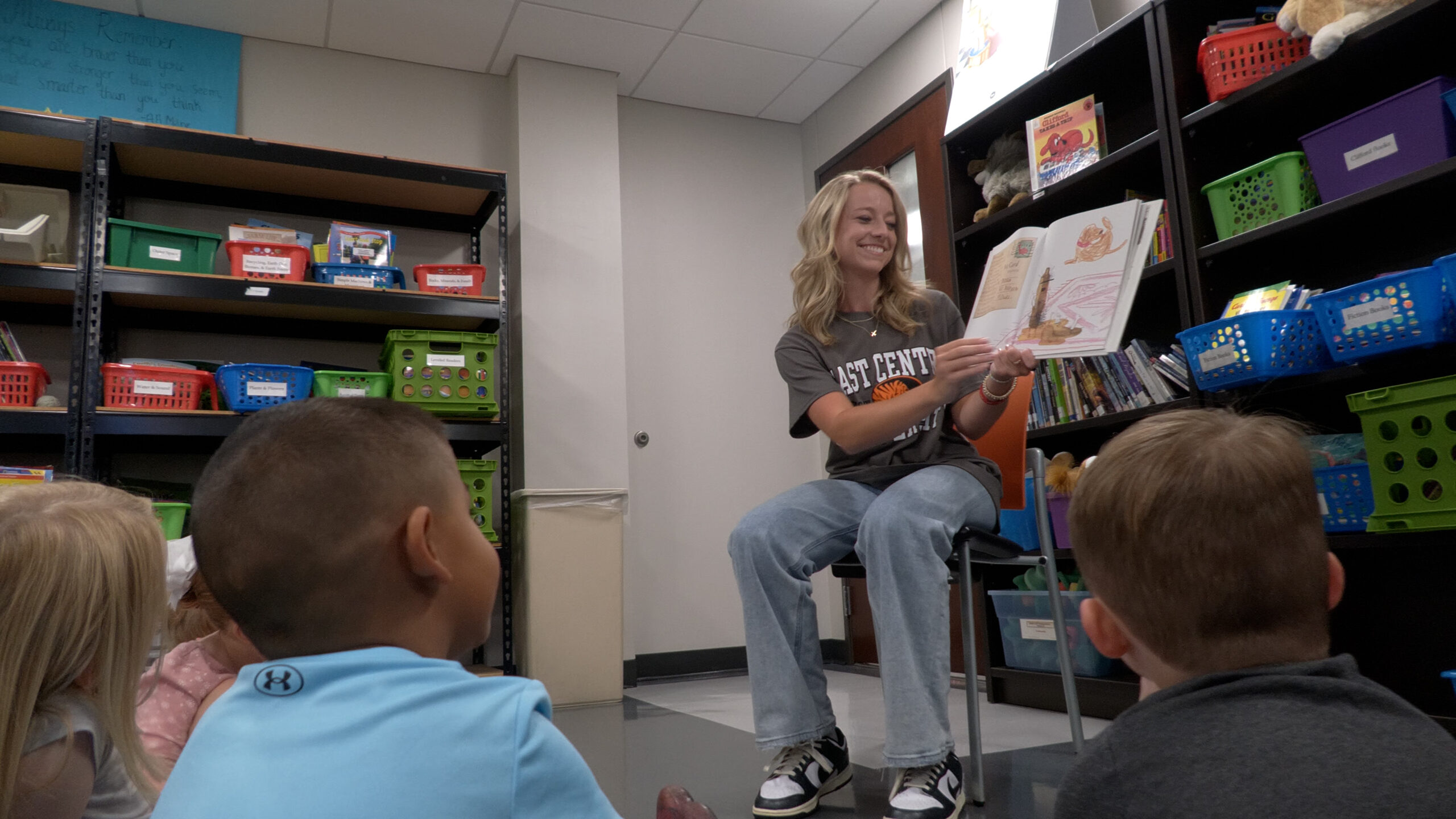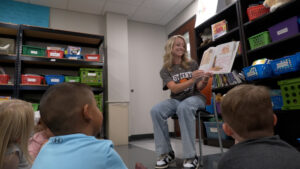
Harnessing the Strengths of Rural Education: ECU’s Innovative Approach
October 24, 2024 by Ada Jobs

By: Sunnie Dawn Baker
No two schools are the same. One of the greatest differentiators between school districts is that of the urban versus rural divide. Each school is going to face their own challenges, but the hurdles that rural school districts face are unique to their own circumstances. However, the Dean of the College of Education and Psychology at East Central University, Dr. Jerry Mihelic, sees that the things that many view as deficits can actually be assets. This is one reason why it is important to study rural education, intentionally, as its own specific field. Since 2022, ECU has been leading the way with their Chronicle of Rural Education (CORE), the same year they advanced their plans for a doctoral program in Rural Education.
In 2019, Mihelic and his colleagues started a discussion on how best to impact rural education; they decided to develop an academic journal to specifically focus on rural issues. While some articles about rural education make it into academic journals, they are in the minority. It was important for educators and researchers to have an outlet where they could present their findings. In addition to its specific focus, another thing that sets CORE apart is that the editors see it as an investment in quality research. The researchers who submit do not necessarily receive an acceptance or a rejection, but rather feedback that allows them to revise and produce a high-quality piece of scholarship that adds to the academic discourse. This heightens the discussion around rural education, while also helping prospective authors become better researchers.
It was no coincidence that around the same time that CORE was launching, ECU President Wendell Godwin and the Provost, Dr. Jeff Gibson, approached Mihelic about the possibility of creating a doctoral program in rural education. This would allow ECU to become a resource and a hub for rural educators in Oklahoma and the nation. The development of the Doctor of Education program in Rural Education at ECU took two years, and now it has its final approval from the High Learning Commission. There are only three other programs in the nation that have rural education as either a focus or an option. And, as an exclusively online degree, this can have an impact far beyond our community.
ECU is planning on offering five different times for applicants to begin their coursework. To apply, an individual must hold a master’s degree and have a minimum GPA of 3.0. After applicants meet these requirements, they must provide references and a writing sample because the faculty want to ensure the students are prepared for success. However, due to the program’s online structure, ECU does not currently limit the number of students who can enroll at any given time. Mihelic has already received expressions of interest from 56 individuals; now, that they have approval from the HLC, courses can commence in Spring 2025.
The program includes a total of 60 hours of coursework, with twelve hours dedicated to the Applied Dissertation. This is another thing that makes this program remarkable. This dissertation focuses on actionable change within the students’ communities, rather than following the traditional academic book-style dissertation. The program encourages students to work on their dissertation throughout their coursework, building ideas that lead to real change through programs and projects that benefit their communities. This approach has multiple benefits. The program not only encourages students to focus on practical, implementable initiatives that lead to positive change, but also supports them in making these initiatives happen. So, if you take the 56 students who have already expressed interest, not only are we getting 56 individuals that are thinking about how to make rural educational opportunities better, but they also represent 56 different projects or programs that are being realized in rural America.
According to the Oklahoma State Department of Education, rural education leaders need to know how to address the unique issues in rural communities such as “varying access to healthcare, food security, internet connectivity, access to advanced coursework, and high-quality educational resources.” This program will help address these definite challenges. However, despite the difficulties, there are also many benefits to rural education and rural communities. Mihelic points out that, while people might have to wear many hats, perhaps being the principal and baseball coach and bus driver, this just makes them more connected to their students and their community. They become invested in their community and the community becomes invested in the school. Schools may rely heavily on volunteer support, but this involvement brings more parents into the school as an active part of their children’s daily education. Also, in rural schools, they support each other in remarkable ways. Whether it is having a grand send off for a softball team or hosting a fish fry for a family who lost their home to fire, people in rural communities come together. So, while there might be struggles, there are also benefits to being in a rural community and a rural education system. Through programs like the EdD in Rural Education at ECU, perhaps educators will be able to mitigate the challenges while enhancing the joys.
Written by
Ada Jobs
You may also interested in:

ADA'S GROWTH IN MOTION
STRATEGIC INVESTMENT & A CLEAR PATH FORWARD On February 19th, community members gathered for the City of Ada’s State of the City address, where leadership outlined more than $100 million
SIEGE AXE LOUNGE'S HIGH-TECH EDGE
BY: CATHLENA SPENCER When you think of axe throwing, you might picture wooden targets and painted bullseyes. Siege Axe Lounge, the 2nd Place winner in the Revenue-Generating category of Grow
A ROUNDPEG FOR A SQUARE PROBLEM
BY: CATHLENA SPENCER For many small business owners, the hardest part of the job isn’t serving customers- it’s the invisible battle with inventory. Knowing what to reorder, how much, and
FROM TRAUMA BAY TO TECH STARTUP: HOW TWO HEALTHCARE VETERANS LAUNCHED SOBER SALLY'S TO SAVE LIVES
BY: CATHLENA SPENCER In the world of entrepreneurship, necessity is the mother of invention. For Erin Ogee and Crystal Glass, the necessity was stopping drunk driving, a mission forged from
OKA' CAMP: A DAY OF WATER, WORDS, AND WISDOM
WATERSlumber, a desolate mind, trapped with thoughts of what is and what could have been. Awakened, but not by the beauty. A lust for power has gripped the heart of
GET READY TO GROW: YOUR GUIDE TO FALL INNOVATION WITH GROW ADA
BY: CATHLENA SPENCER Have you ever wondered how a good idea becomes a great business? This fall, Grow Ada is rolling out a series of events designed to be your
BUILDING FUTURES: WORK READY ADA CELEBRATES ITS FIRST YEAR
BY: CATHLENA SPENCER Just one year ago, Work Ready Ada, a new employment readiness program, was launched in partnership with Pontotoc Technology Center (PTC). The program, funded by Oklahoma Human
AI IN EDUCATION: A CONVERSATION WITH VINAYAK MITTY
BY: SUNNIE DAWN BAKER One of the areas in technology with the most potential for entrepreneurial growth is Artificial Intelligence (AI). AI is increasingly shaping every part of our lives,
FROM PARKS TO PRODUCTIVITY: THE ECONOMIC IMPACT OF ADA'S QUALITY-OF-LIFE INVESTMENTS
BY: SUNNIE DAWN BAKER Enhancing quality of life is one of the most crucial aspects of developing a local economy. In the 21st century, many people can live and work